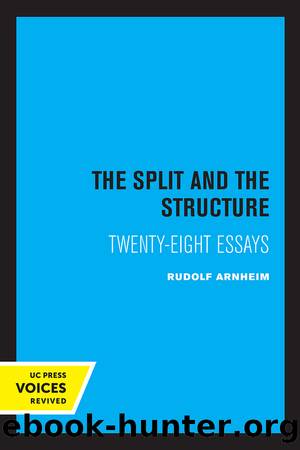The Split and the Structure by Rudolf Arnheim;

Author:Rudolf Arnheim; [Arnheim, Rudolf]
Language: eng
Format: epub
ISBN: 9780520917644
Publisher: University of California Press
Published: 2020-12-23T00:00:00+00:00
Deus ex Machina
As I reread Molièreâs Le Tartuffe, it occurred to me that, by the way the play ends, it fails to unravel the plot to which it is committed. It cancels the final development by the fiat of a superior power, external to the forces that generated the play. As Molière misuses his play to pay homage to his patron, the king, he disobeys Aristotleâs rule that âthe unravelling of the plot, no less than the complication, must arise out of the plot itself, it must not be brought about by the Deus ex Machina. ⦠The Deus ex Machina should be employed only for events external to the dramaâfor antecedent or subsequent events which lie beyond the range of human knowledge and which require to be reported or foretold; for to the gods we ascribe the power of seeing all things.â1
Aristotle does not deny that in the drama superior powers may legitimately occupy the kind of function that only they can meet, as distinguished from the limited resources of humans. He implies that the human mind deserves the privilege of discerning, within its range of understanding, the good from evil and of resisting, within the range of its power, the irrational forces of passion. The question raised by Molièreâs handling of his plot comes down to asking what interferences by superior powers disturb the compelling logic of drama. Those interfering powers may be supernatural if, for the purpose of fiction, they are admitted as agents in human affairs. They also may be terrestrial, cutting the Gordian knot by wilful decree.
In Le Tartuffe, Molière presents a good-hearted but ingenuous man, exploited by a hypocritical faux dévot to the extreme of being robbed of all his possessions and even threatened with imprisonment. He is rescued only by the supreme wisdom and justice of the king, who unmasks and punishes the villain. Molière deprives his characters thereby of their right and duty to resolve the predicament in which they are caught. The king is not a legitimate agent of the plot in that
First published in British Journal of Aesthetics, vol. 32, no. 3, 1992. Reprinted by permission of Oxford University Press.
he does not share the spiritual problem imposed upon the characters by their encounter with the faux dévot.
What exactly are the charactersâ rights and duties? Since they are brought to life by a work of art, not by the real world, they are not primarily charged with the practical task of defeating the villain. The conflict of forces, of which the play consists, cannot be a purely physical one, otherwise it might as well be a boxing match or a duel of animals. Nor does the play call for an inquiry into the nature of evil. The faux dévot is not the center of the plot but only its external cause. The center is held by the innocent victims, who must face the problem of evil. How are Orgon and his family going to find in their minds a way
Download
This site does not store any files on its server. We only index and link to content provided by other sites. Please contact the content providers to delete copyright contents if any and email us, we'll remove relevant links or contents immediately.
The remains of the day by Kazuo Ishiguro(7623)
Tools of Titans by Timothy Ferriss(7021)
The Black Swan by Nassim Nicholas Taleb(6258)
Giovanni's Room by James Baldwin(5968)
Inner Engineering: A Yogi's Guide to Joy by Sadhguru(5947)
The Way of Zen by Alan W. Watts(5844)
The Six Wives Of Henry VIII (WOMEN IN HISTORY) by Fraser Antonia(4828)
The Power of Now: A Guide to Spiritual Enlightenment by Eckhart Tolle(4806)
Astrophysics for People in a Hurry by Neil DeGrasse Tyson(4652)
Asking the Right Questions: A Guide to Critical Thinking by M. Neil Browne & Stuart M. Keeley(4642)
12 Rules for Life by Jordan B. Peterson(3796)
The Ethical Slut by Janet W. Hardy(3548)
Skin in the Game by Nassim Nicholas Taleb(3515)
Housekeeping by Marilynne Robinson(3456)
The Art of Happiness by The Dalai Lama(3422)
Double Down (Diary of a Wimpy Kid Book 11) by Jeff Kinney(3314)
Skin in the Game: Hidden Asymmetries in Daily Life by Nassim Nicholas Taleb(3303)
Walking by Henry David Thoreau(3263)
12 Rules for Life: An Antidote to Chaos by Jordan B. Peterson(3222)
